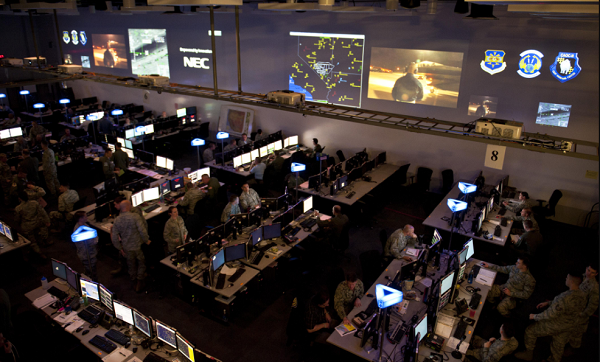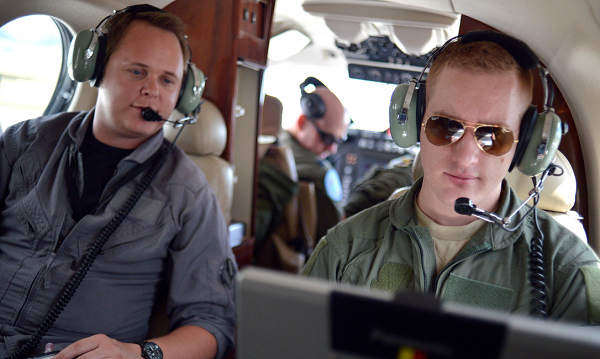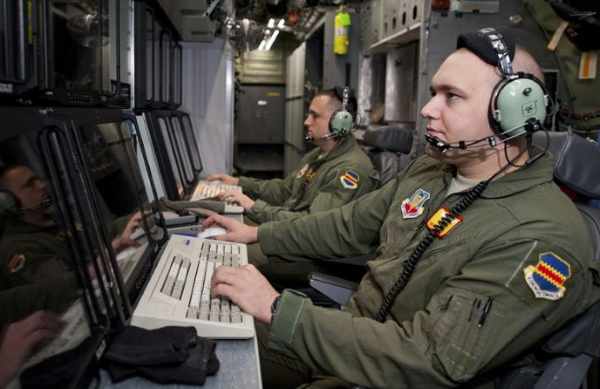An Air Force Airborne ISR Operator (1A8X2) collects and provides top-secret intelligence to command.
An Airborne ISR, or Intelligence, Surveillance, and Reconnaissance Operator, collects information about the enemy, including strength, movements, and activity.
This position requires individuals to be highly trained on both techniques and equipment to ensure they can gather and provide the best intellect possible.
Education, Qualifications, and Training
This position requires a top-level clearance and will have additional qualifications that other positions may not have.
Education
Individuals must have a High School Diploma or GED and 15 college credits.
They must also meet the ASVAB General Air Force requirements.
Qualifications
Generally, you must be a U.S. citizen to be provided top-level clearance positions.
Additional qualifications include:
- Be 64 to 77 inches tall (no more, no less)
- 17 to 39 years old
- Maintain eligibility to deploy and mobilize anywhere in the world
- Knowledge of aircraft procedures
- Knowledge of emergency equipment
- Complete/Pass a polygraph test
- Complete/Pass a current Single Scope Background Investigation (SSBI)
- No previous history of temporomandibular joint pain or joint pain disorders
Related Article – 20 Health Conditions That May Disqualify You From Military
Training
Recruits will attend Basic Military Training for 8.5 weeks.
After completing Basic Training, recruits will remain at Lackland Air Force Base for two weeks for the Aircrew Fundamentals Course. Then, they’ll head to Goodfellow Air Force Base for three weeks for the Intelligence Fundamentals Course.
An ISR operator is also required to complete Aircrew Survival School as a primary crewmember.
You can find more information on the training outline and progression of this position by reading the Education and Training Plan here.
What Does an Airborne ISR Operator do?

Airborne ISR Operator specialist must have knowledge of all U.S. and allied tasks.
They will participate in tactical mission planning.
These specialists are required to operate, evaluate, and manage Airborne ISR information and any related ground-processing system that they may use.
They perform identification, acquisition, analysis, and reporting of ISR tasks.
Airborne ISR Operator specialists are required to learn, demonstrate, and maintain proficiency in emergency equipment use and procedures.
When these specialists are in an airborne situation, they are required to process intelligence information.
Any threat-warning information that they discover will be relayed to ground commanders.
These specialists interface with other units and are involved with mission planning.
They are in charge of maintaining currency items, assigned publications, and all information obtained on current missions.
Related Article – Air Force PT Test Standards
Some equipment that they may use includes:
- Operator workstations
- Recording devices
- Graphical Displays
- Computerized Radio systems
- Direction Finding Equipment
Individuals will perform preventative maintenance on equipment.
When classified material and aircrew gear are loaded and off-loaded, the Airborne ISR Operator will supervise the transport and apply any restraints necessary to avoid movement in flight.
They will also ensure that all equipment is clean, free of hazards, and is not placed in an area that could block emergency access.
These specialists conduct environmental surveys of radio frequencies, document the events, measure the parameters of the events, and then compare it to previous documentations to find a source.
They work to analyze machine-based communications.
Any significant events or essential elements will be extracted and categorized as a follow-up item.
All other information will be logged and documented.
Before and after every flight, the specialist will create mission reports including all of the details of the mission.
To compile the most efficient data, individuals will compare sensor data, participate/give feedback to mission planning inputs, use coordinate reference systems, and create mission profile requirements.
Overall, these specialists provide intelligence, complete threat warning requirements, and establish situational awareness for all upcoming and current, ground and maritime combat operations including air, ground, and maritime force intelligence.
Related Article – Navy Intelligence Specialist (IS): Career Details
What does an Air Force Airborne ISR Operator make?
Airborne ISR Operator’s base pay will be dependent on the rank and years of service.
Individuals can receive bonuses in certain positions.
You can view the table below for a reference point on Air Force base pay.
| Insignia | Pay Grade | Rank | Abbreviation | 2023 Minimum Monthly Pay |
|---|---|---|---|---|
| E-1 +4 months | Airman Basic | AB | $1,917.60 | |
| E-2 | Airman | Amn | $2,149.20 | |
| E-3 | Airman First Class | A1C | $2,259.90 | |
| E-4 | Senior Airman | SrA | $2,503.50 | |
| E-5 | Staff Sergeant | SSgt | $2,730.30 | |
| E-6 | Technical Sergeant | TSgt | $2,980.50 | |
| E-7 | Master Sergeant | MSgt | $3,445.80 | |
| E-8 | Senior Master Sergeant | SMSgt | $4,957.20 | |
| E-9 | Chief Master Sergeant | CMSgt | $6,055.50 | |
| E-9 | Command Chief Master Sergeant | CCM | $6,055.50 | |
| E-9 | Chief Master Sergeant Of The Air Force | CMSAF | $6,055.50 |
Benefits
In addition to the base pay above, airmen will be offered a variety of benefits.
Free to low-cost medical and dental insurance and low-cost life insurance options are available.
Airmen also receive paid sick time, paid vacation, and paid retirement package.
All individuals will receive housing and food allowances.
The allowances will depend on location, rank, and family status.
Individuals can receive education assistance and scholarships for certain positions.
On-base benefits include recreational activities, social events, youth programs, and tax-free department and grocery stores.
Job Reviews
This position is difficult and may require a lot of travel.
Most days, the job will be very engaging and the work will be satisfying.
Individuals who have held this position like the work that they do.
Generally, they do not like the deployments.
The video below shows the position from multiple points of view and gives a good outlook on what a day could be like.
Civilian Career Opportunities
This top-level security position allows individuals to develop skills in research, analysis, information, and administration.
It is hard to find a truly comparable position because of the large scope of responsibilities individuals have, but there are positions that closely match the responsibilities of intelligence, surveillance, and reconnaissance.
Civilian career positions include:
- Intelligence Data Science and Analytics
- Radio Frequency Engineer
- ISR Tech Director
- ISR Advisor
- Targeting Analyst
Most of these positions are higher paid positions and offer great benefit packages.
Having experience in ISR in the military will give individuals preferred positioning among other candidates.
Related Article – Air Force Operations Intelligence (1N0X1): Career Profile
Summary

An Air Force Airborne Intelligence, Surveillance, and Reconnaissance (ISR) Operator is in charge of gathering, evaluating, and dispensing top-level security information.
These individuals gather information on the ground and in the air, ensuring the safety of the mission.
They provide information to customers, store data for future use, and let commanders know of immediate threats.
This high-security position has very specific qualifications that individuals must meet in order to be considered.
Specific qualifications include height requirements and passing multiple background/clearance checks.
Individuals in this position will be paid based on rank and time of service.
They will also be offered the generous benefits that are provided to all airmen.
This position may come with a lot of travel but is an exciting and fast-paced career field.
Experience in this position allows for many opportunities in civilian jobs.
References
Air Force Airborne ISR Operator
- Ikon Pass Military Discount: Learn How To Save Big - January 31, 2025
- RTIC Military Discount: Find Out How To Save Big on Gear - January 30, 2025
- Traeger Military Discount: Learn How To Save Big on Smokers - January 28, 2025
General FAQ
What is an airborne ISR operator?
An Air Force Airborne ISR Operator works as primary aircrew to manage the collection of ISR information (Intelligence, Surveillance, and Reconnaissance) while airborne and processing this data on the ground.
What is the difference between intelligence surveillance and reconnaissance?
Surveillance is done when there is a single known target for collecting data. In intelligence reconnaissance, intelligence covers larger areas with multiple observation points.
Do I need a security clearance to be an Air Force Airborne ISR Operator?
An ISR operator is a sensitive position, and candidates will be required to be U.S. citizens, take a polygraph test, and pass an SSBI (Single Scope Background Investigation).
How long is tech school to become an Air Force Airborne ISR Operator?
ISR operators remain at Lackland AFB for two weeks for the Aircrew Fundamentals Course. Then, they'll head to Goodfellow Air Force Base for three weeks for the Intelligence Fundamentals Course. An ISR operator is also required to complete Survival School.
How much are Air Force Airborne ISR Operators paid?
Like all military positions, the pay for an ISR operator is based on rank and time in service. However, this career field may qualify for special allowances like flight pay or incentive bonuses.

